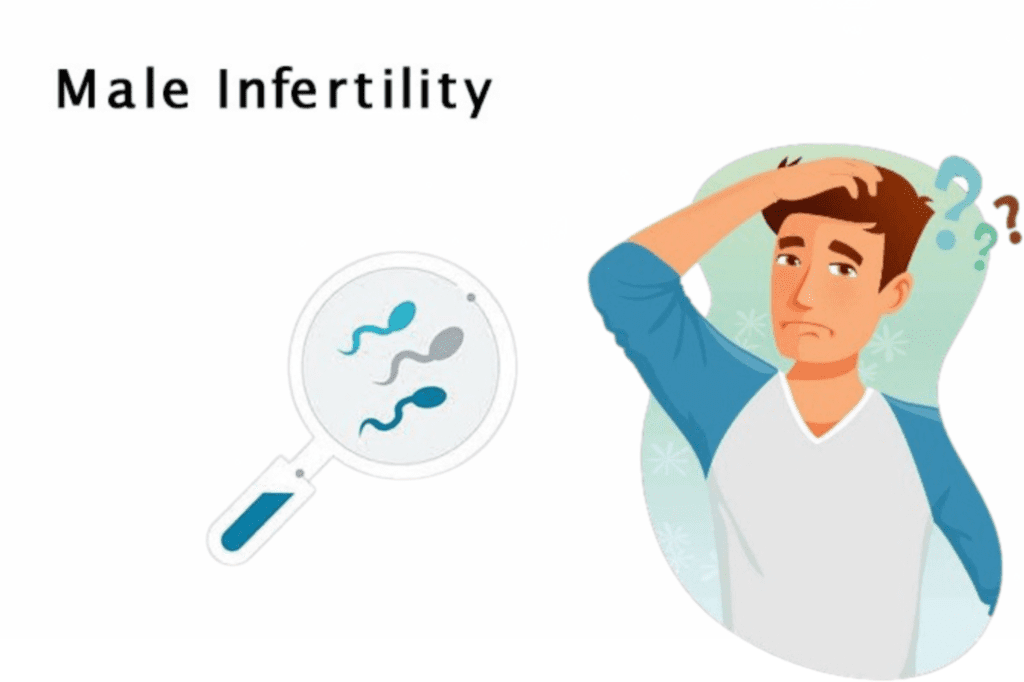Male Infertility: What Every Man Needs to Know


Male infertility refers to a condition where a man has a reduced ability to conceive a child with his partner. It accounts for 50% of all infertility cases globally. It typically involves issues with sperm production, function, or delivery. This condition can make starting a family more challenging. However, with the right support and treatment, many couples can still achieve their dream of having a baby. Diagnosis involves evaluating the male partner’s fertility through medical tests and assessments.

Symptoms of Male Infertility
- Difficulty in conceiving a child after a year of unprotected intercourse.
- Problems with sexual function, such as reduced libido or erectile dysfunction.
- Pain, swelling, or lumps in the testicle area.
- Abnormal breast growth (gynecomastia) due to hormonal imbalances.
- Decreased facial or body hair, indicative of hormonal issues.
Common Causes of Male Infertility
- Low Sperm Count (Oligospermia)
- Poor Sperm Motility (Asthenozoospermia)
- Abnormal Sperm Morphology
- Ejaculatory Disorders
- Hormonal Imbalances
- Varicocele
- Infections
- Lifestyle Factors
- Environmental Factors
Doctor’s Solutions to Male Infertility
Medical solutions depend on the underlying cause of infertility. Hormonal therapy may be prescribed to address imbalances, while surgery can correct physical issues like varicocele. Assisted reproductive technologies (ART), such as in-vitro fertilization (IVF) or intracytoplasmic sperm injection (ICSI), are effective options for severe cases. Regular consultations with a urologist or fertility specialist are crucial to determine the most suitable treatment.
Take Charge of Your Fertility
While lifestyle modifications like maintaining a healthy weight, avoiding smoking, and reducing alcohol consumption are essential, adding a targeted nutritional supplement can provide the extra support needed to address male infertility. By incorporating nutritions like Co-enzyme Q10, Omega-3 fatty acids, L-Arginine, Lycopene, and complementary nutrients, men can take proactive steps toward improving their reproductive health and overall well-being.
Role of Nutrition and Diet in Addressing Male Infertility
Proper nutrition plays a vital role in improving male fertility. A diet rich in antioxidants, vitamins, and minerals can enhance sperm quality and overall reproductive health. A combination of scientifically-backed ingredients such as Co-enzyme Q10, Omega-3 fatty acids, L-Arginine, and Lycopene has shown significant promise in addressing male infertility.
- Co-enzyme Q10 (CoQ10): Improve sperm motility and overall quality.
- Omega-3 Fatty Acids: Improve sperm motility and membrane structure.
- L-Arginine: Enhances blood flow by increasing nitric oxide levels in the body.
- Lycopene: Improve sperm count, motility, and morphology.
- Selenium: Enhances sperm count and prevents DNA damage.
- Vitamin C and E: Powerful antioxidants that protect sperm from oxidative stress.
- Zinc: Critical for testosterone production and sperm quality.
- Piperine: Improves the bioavailability of other nutrients, ensuring optimal absorption.
How This Nutritional Blend Can Help
When combined, these ingredients work synergistically to:
- Improve sperm quality, count, and motility.
- Protect sperm DNA from oxidative stress.
- Support hormonal balance and testosterone production.
- Enhance overall reproductive health and vitality.
Consult Your Healthcare Provider
Before starting any supplement, it is crucial to consult with a healthcare professional to ensure it aligns with your individual health needs. With the right combination of nutrients and a healthy lifestyle, overcoming the challenges of male infertility is within reach.
